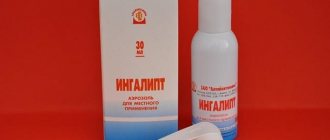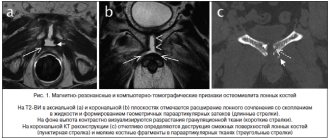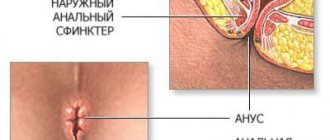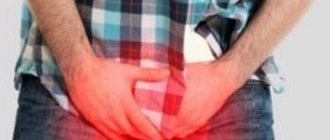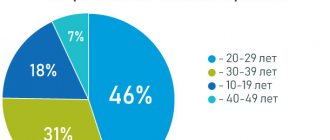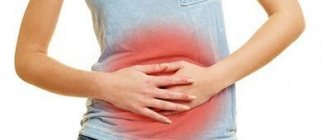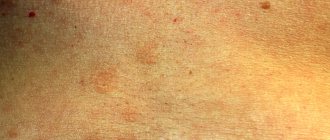Obsessive itching in the anal canal is a symptom that is rarely addressed to a doctor. It is considered inconvenient, sometimes indecent, and is often ignored. Meanwhile, itching near the anus or inside it does not occur for no reason. It may hide a serious intestinal or rectal disease, endocrine disorders and parasites.
To say goodbye to unbearable itching in an “inconvenient place” once and for all, you need to find out the reasons for its occurrence, and then select effective treatment methods.
Causes of itching
The cause of anal itching can be worms.
For many people, it becomes unclear why at one moment they begin to feel itching. In fact, there are a lot of reasons for this phenomenon, and they are all quite diverse and often unrelated to each other. The main causes of anal itching include:
- Diseases of the rectum and anus, during which itching of the anus is one of the most obvious and very first symptoms that appears. In more detail, these diseases include hemorrhoids, rectal prolapse
- Worms. When worms appear in the body, a person not only begins to lose weight while eating normally, but he also begins to be bothered by anal itching, which appears due to the destructive effects of worms. They damage the mucous membrane, thereby causing discomfort.
- Diseases of the genital organs. Often, infections that cause diseases of the genital organs easily penetrate the rectum only because these organs are located close to each other. And therefore, when itching appears, especially women, they are forced to check first with a gynecologist to rule out problems with the reproductive system, and only then are referred to a proctologist
- Constipation. During constipation, toxins accumulate in the intestines, and because of this, tissues can react to them this way. In addition, during constipation, the intestinal walls stretch, and so does the skin, and due to distension, small microcracks can form
- Fungus. No person is immune from contracting a fungus on their skin. Most often this happens when constantly using public toilets, where, although they are cleaned, they are not completely disinfected.
- Neoplasms, both malignant and benign. Due to the fact that the tumor puts pressure not only on the skin, but also on the nerve endings, the reaction may be different. In addition, if the size of the tumor is large, then most likely it will stretch the ligaments, mucous membrane, and with them the skin, which will cause itching
- Allergic reaction. Very often, when using new soap or other personal hygiene products, a person may experience an allergic reaction to new components (chemical)
- Sweating, especially in obese people
- Uncomfortable underwear, especially for girls
- Poor or, conversely, excessive hygiene. The moment a person applies a lot of soap or any other personal hygiene product, the skin becomes very dry, so frequent washing is comparable to not using hygiene products at all. Only the reasons will vary slightly. If in the case of excessive hygiene there will be dry skin, then in the case of a lack of it - the penetration of bacteria that have a destructive effect
In addition, diabetes mellitus can be the cause of itching in the anus. True, not all doctors are able to diagnose it in the presence of this particular symptom, because first of all they think about completely different ones, and look for problems directly in the intestines. And after the intestines and genitals have been rechecked and the cause is not in them, the doctor may ask the person to donate blood for sugar to confirm his hypothesis.
Why there is itching in the anus - the main reasons
If you have complaints about anal itching, you can contact your doctor. After an initial examination, he will refer the patient to a specialist - a proctologist, gastroenterologist, infectious disease specialist, urologist or gynecologist. The patient may have to consult several specialists and undergo several tests.
At the initial stage of diagnosis, the doctor will consider specific symptoms, based on which it can be assumed that as a result of itching in the anal area. There are several dozen diseases with this symptom.
Pathologies of the rectum
The most common cause of itching in the anus in adults is diseases of the rectum. These include:
- external or internal hemorrhoids;
- chronic proctosigmoiditis;
- neoplasms in the rectum (polyps or cancerous tumors);
- neoplasms in the folds of the anus and around the anus (genital warts);
- anal fissures;
- anorectal fistulas.
If the itching around the anus is not accompanied by mucus and blood, and upon examination dry, flesh-colored formations are found, we are talking about genital warts.
Important! Benign neoplasms appear due to infection with the human papillomavirus (HPV). Under certain conditions, this infection provokes the formation of perianal condylomas and papillomas, which can then develop into anal canal cancer.
If, in addition to itching, the patient complains of pain in the rectum, discharge of blood and mucus, there is a high probability of proctological diseases - fissures, hemorrhoids, fistulas, etc. Unpleasant symptoms in such diseases worsen after defecation.
Pathologies of the genitourinary system
Itching around the anus can occur against the background of gynecological and urological diseases and infections of the genitourinary organs. The most common reasons for its appearance:
- candidiasis;
- chlamydia;
- trichomoniasis;
- gonorrhea and other STDs.
Sometimes it can be sexually transmitted herpes. You can recognize it by its watery bubbles (photo below).
There may be no signs other than itching in such pathologies. However, in most cases, they are indicated by discharge from the genital tract (green or purulent, in the form of foam or cottage cheese, mixed with blood, etc.), an unpleasant odor from the genitals, pain in the lower abdomen, rashes and weeping sores.
Important point! The mentioned diseases in 90% of cases are accompanied by enlarged lymph nodes in the groin. Sometimes this is the only sign, other than itching, that helps the doctor make the correct diagnosis.
Parasitic infections
The second most common cause of itching in the anus is infection with intestinal parasites - pinworms, roundworms, giardia. They are more likely to bother children and adolescents, causing severe discomfort after bowel movements and upon waking up. Additional signs by which helminthic infestations can be diagnosed:
- fatigue;
- drowsiness;
- allergic reactions (rash, runny nose);
- low-grade fever;
- nausea and/or vomiting;
- bloating;
- intestinal spasms and stool upset.
With ascariasis and enterobiasis, live or dead parasites are observed in the feces. Pinworms can be found near the anus on the skin or even on underwear. They especially often come out at night or in the morning.
Interesting fact! In 90% of cases, helminth infection occurs through contact with domestic animals and during play in outdoor sandboxes. This also occurs when there is contact with personal belongings of helminth carriers.
Intestinal diseases
Itching in the perianal area occurs with inflammatory and infectious bowel diseases, which are accompanied by prolonged diarrhea or constipation. Abnormal bowel movements provoke irritation of the mucous membrane of the rectum and anal folds, resulting in burning or itching.
Other reasons
In addition to the previously described diseases, severe itching in the anal area is also provoked by other pathological conditions:
- skin diseases - dermatitis, psoriasis, seborrheic eczema and lichen;
- allergic reactions;
- diaper rash;
- side effects when taking medications.
Some mental and nervous disorders also lead to severe itching, including an obsessive desire for cleanliness of the perineum, stress, and depression.
Regardless of what caused this unpleasant symptom, you should seek help from a doctor. Each of the described diseases does not disappear on its own, and over time leads to serious complications. Thus, as hemorrhoids progress, vascular thrombosis or rupture with heavy bleeding may occur, and anal fissures become easily infected and can develop into chronic paraproctitis.
The most dangerous itching is caused by rectal polyps. These seemingly harmless tumors often transform into cancer.
Anal itching as a symptom
Anal itching can be a symptom of hemorrhoids.
Unfortunately, anal itching can be a symptom of a very serious disease that needs to be treated as soon as possible:
- Gynecological diseases: inflammatory processes of the genital organs, both internal and external
- Proctological diseases: hemorrhoids, rectal prolapse, anal fissures
- Viral diseases: condylomas
- Fungal diseases: thrush, actinomycosis
- Dermatology: ringworm, inflammation of the sweat glands, dermatitis
In addition, itching of the anus can be a symptom of diseases such as kidney failure, pancreatitis, which are associated with metabolic disorders, as well as worms and pubic lice.
Causes of burning in the anus
Microtraumas
In healthy people, a burning sensation can occur due to improper hygiene: using a hard washcloth and coarse toilet paper, or excessive use of soap.
In this case, microtraumas of the anal sphincter are formed, which are manifested by unpleasant tingling and burning sensations. Discomfort in the anus is moderate and is not accompanied by other pathological signs. Within 2-3 days after eliminating the cause, the symptoms disappear without a trace. Severe burning in the rectum is observed after anal sex, since the anal mucosa is very delicate and easily injured. Discomfortable sensations bother a person for several days, sometimes combined with stool upset and fecal incontinence. Similar manifestations are also found among adherents of sexual practices involving the insertion of foreign objects into the anus.
Proctitis
Acute inflammation of the rectum causes a constant painful burning sensation in the anus, accompanied by intense pain and anal itching. With proctitis, burning sensations reach their maximum severity at the time of defecation. After bowel movements and anal hygiene, the symptoms decrease slightly, but do not stop completely. Patients complain of the discharge of mucus, pus with streaks of blood from the anus.
With chronic proctitis, the symptoms are mild. Moderate burning, tingling, itching in the anus predominates, which causes discomfort, but does not interfere with performance and general condition. Mucus impurities are often noticeable in the stool. Such symptoms persist for several months. Exacerbation of proctitis is characterized by increased temperature, increased pain, and the appearance of mucopurulent discharge from the anus.
Haemorrhoids
A pronounced burning sensation in the anal area is noted already at the first stage of the disease. The patient experiences excruciating burning pain during bowel movements. Sometimes it is so strong that the patient tries to suppress the urge to have a bowel movement, further aggravating the situation. Moderate burning in the anus is observed throughout the day, the symptom intensifies with prolonged sitting.
As hemorrhoids progress, characteristic symptoms are supplemented by prolapse of venous nodes, which is manifested by severe pain. In the third or fourth stages of the disease, the burning sensation reaches its maximum intensity, which is why the patient cannot sit. There is constant bleeding during bowel movements. Against this background, the skin surrounding the anus becomes macerated, which aggravates the burning sensation and itching.
Burning in the anus
Anal fissure
The appearance of burning and pain is characteristic directly during the process of defecation, when a rupture of the rectal mucosa occurs. Unpleasant sensations can radiate to the sacrum and perineum. A few drops of blood remain on toilet paper or on the surface of stool. A burning sensation in the anus periodically bothers you for about 2-3 weeks until the defect heals completely. The symptom is combined with sphincter spasm, which makes defecation difficult and increases discomfort.
If treatment of an acute anal fissure is not carried out, it becomes a chronic defect. In this case, a burning sensation in the anus often develops after defecation and persists for a long time. Constant burning sensations, discomfort when sitting and walking reduce the quality of life of patients. Patients are afraid of bowel movements, so they postpone this process or abuse laxatives.
Fecal incontinence
Involuntary excretion of feces leads to maceration, inflammation and ulceration of the perianal area, causing intense burning. The symptom is a constant concern and decreases slightly after hygiene measures and the use of medications. If incontinence is associated with proctological diseases, the burning sensation is complemented by pain, discharge of pus or blood from the anus.
Rectal tumors
Discomfort in the anal area occurs both with benign formations (polyps, villous tumors) and with rectal cancer. The first group of neoplasms is asymptomatic for a long time. A burning sensation occurs when the formations reach large sizes, become inflamed or eroded. Malignant tumors have a varied clinical picture: burning pain in the anus, spasms of the rectal sphincter, discomfort in the lower abdomen.
Anococcygeus pain syndrome
With coccydynia, a burning sensation in the anus occurs in the absence of organic changes in the rectum. Patients complain of debilitating burning sensations, sudden spasms, itching, and tingling. The symptoms bother the patient for several months and are not relieved by typical analgesics and antispasmodics. The burning periodically increases and decreases, sometimes disappears completely for a while, after which it resumes again.
Perianal dermatitis
Inflammation of the skin around the anus is manifested by constant painful burning and itching, as a result of which patients scratch the affected area. When the skin is injured by nails, the discomfort increases. The burning pain becomes excruciating and constant, as a result the person cannot sit or lie on his back. With perianal dermatitis, the skin around the anus is hyperemic, swollen, and covered with vesicular and pustular rashes.
Rare causes
- Helminthiases:
enterobiasis, ascariasis, strongyloidiasis. - Inflammatory processes
: cryptitis, sigmoiditis. - Gynecological diseases
: rectovaginal fistula, chronic pelvic pain syndrome in women. - Urological pathology
: prostatitis, colliculitis, prostate cancer
. - Sexual infections
: genital herpes, gonorrhea, chlamydia. - Metabolic disorders
: diabetes mellitus, hypothyroidism, Itsenko-Cushing's disease.
Types of Anal Itching
Depending on what causes the itching, the intensity of its manifestation will vary. So, it is customary to highlight:
- Severe itching. It appears suddenly, and becomes stronger every minute. At the same time, increased humidity is observed in the anal area, due to which the skin becomes even more irritated and the itching becomes stronger. Most often, severe itching occurs with diseases such as anal fissures, hemorrhoids, thrush
- Chronic anal itching, which is largely due to dry skin around the anus, or, conversely, a gradual increase in sweating. As a rule, itching accompanies a person constantly, and in order to get rid of it, one has to use special creams and ointments. Mostly chronic itching is characteristic of chronic hemorrhoids, renal failure
Depending on what type of anal itching torments a person, further treatment will depend, because acute manifestations of the symptom indicate that the inflammatory process began quite recently and has not yet reached a more severe stage.
Treatment
Help before diagnosis
To reduce burning in the anal area, you need to carefully maintain hygiene. The perineum is washed with warm water after each bowel movement, and when mucus or pus is discharged from the anus, water procedures are performed more often. To prevent maceration of the skin, it is necessary to wear soft cotton underwear, and in case of heavy discharge, use special pads.
Soap and other chemicals used for hygienic purposes should be thoroughly rinsed off, as residual products can cause severe burning. For comfortable cleansing of the perianal area, it is recommended to have damp toilet paper that does not injure the skin and does not aggravate discomfort. You can take medications only after a visit to a proctologist, who will find out the cause of the discomfort and select therapy.
Conservative therapy
Treatment of any proctological disease begins with a special diet. The diet limits fatty, salty and spicy foods, and reduces the content of coarse fiber. The gentle menu provides a soft consistency of stool to prevent constipation and make bowel movements as painless as possible. Taking into account the etiology of burning in the anus, the following are prescribed:
- Rectal suppositories
. Suppositories with anti-inflammatory and emollient components quickly eliminate itching and burning in the rectum and improve the patient’s well-being. Medicines facilitate the act of defecation, envelop the rectal mucosa and protect it from damage. - Antibiotics
. In acute proctitis, drugs quickly eliminate the pathogenic pathogen, prevent the spread of the inflammatory process and the development of paraproctitis. If the pathology is caused by worms or protozoa, other etiotropic drugs are recommended: anthelmintic, antiprotozoal. - Hormones
. Taking corticosteroids in short courses can quickly relieve inflammation and swelling in severe proctitis and exacerbation of hemorrhoids. For allergic etiology of anal burning, treatment is supplemented with antihistamines. - Phlebotropic agents
. Drugs to strengthen the venous walls are used for hemorrhoids to prevent the nodes from enlarging and bleeding from them. In the acute period, local combination drugs are indicated that have venotonic and analgesic effects.
For targeted administration of medicinal substances into the anus, microenemas with local anesthetics, chamomile decoction, and oil solutions are used. After the acute process subsides, sitz baths with potassium permanganate and a perineal shower are prescribed. To eliminate burning and pain, physiotherapeutic effects are used: laser radiation, diadynamic therapy, ultrasound.
Diagnostics
Diagnostics with a practicologist will help make the correct diagnosis.
Despite the fact that the symptoms manifest themselves quite clearly, talking about what problem caused it and what needs to be done next can only be done after consulting a specialist, namely a proctologist, who will conduct a series of studies and prescribe tests, based on the results of which he will diagnose accurate and correct diagnosis.
First of all, the doctor will ask the patient about what caused the itching, how much discomfort it causes, and how long it has been bothering him. In addition, he will ask you to roughly describe your diet, based on which he will be able to understand whether the itching is a simple allergic reaction.
Itching in a child
Anal itching is a shameful situation for many people.
From time to time, parents turn to the pediatrician with a complaint that the child is constantly scratching his butt. Sometimes the reason lies in a simple habit or some other person's example, but most often it happens due to:
- Worms. Children constantly put foreign objects into their mouths, especially one-year-old babies who pull everything from the floor (sandbox, etc.) into their mouths. And it is precisely in this way that worms can enter the body
- Haemorrhoids. This disease is very rare in children, because parents try to provide the child with all the healthy foods, and besides, children do not lead a sedentary lifestyle
- Anal fissure, which can form as a result of some kind of injury or problem in the body. The most common cause is injury, as children often fall
- Poor hygiene. Most often, children can scratch their butts if they do not follow basic rules of personal hygiene or do not wipe well after going to the toilet. This problem becomes especially acute when the child begins to go to kindergarten, where they are taught to be independent.
If your child experiences itching, you should definitely contact a pediatrician or an infectious disease specialist.
What could be the reason
Burning and itching in the anal area in women is such a delicate problem that not every representative of the fairer sex can dare to tell a doctor about it. The discomfort caused by this phenomenon is frightening, alarming and forces one to ask questions: “Why did these symptoms appear, how serious is it, what treatment will be the most effective?”
Let's start by answering the question about the reasons for such undesirable manifestations in the anal passage.
1. Diseases in the rectal area. Here it is very important to focus on identifying all the symptoms present in the patient, because itching and burning may not be the only troubles. Bleeding, severe pain, a feeling of heaviness and the presence of a foreign object in the anus are indicators characteristic of hemorrhoids or rectal fissures. Cancer formations are sometimes accompanied by itching and burning. Treatment should be chosen only after a complete examination and an accurate diagnosis.
2. Parasitic environment in the intestines. Pinworms and Giardia lead to discomfort around the anus. This may be due to larvae deposited in this area by female pinworms, which cause burning and itching. Various types of helminths and ascariasis can also lead to such manifestations. Most often this happens after defecation.
3. Dysbacteriosis. With frequent bowel movements (which is not uncommon with this disease), constant irritation of the mucous membrane occurs and, as a result, itching.
4. “Sexual” diseases in women and representatives of the stronger half of humanity. The presence of female (gonorrhea, chlamydia, trichomoniasis, candidiasis) and male (urethritis, prostatitis) problems often leads to the patient complaining of burning and itching in the anus. One or two visits to a gynecologist per year for women should be the norm.
5. Tendency to allergies and dermatological diseases. Psoriasis, dermatitis, lichen planus, scabies, pediculosis - this is an incomplete list of possible diseases in which the patient experiences discomfort in the anal area.
6. People with excess weight and varying degrees of obesity with sweating and accumulation of microorganisms in the anus area feel irritation in the outlet of the rectum.
7. Patients with diabetes experience itching sensations in the anus and genitals. These manifestations can be relieved by starting treatment for the underlying disease – diabetes.
8. Interruptions in the functioning of the liver, pancreas, and bile ducts.
9. Deviations in the psyche, states of depression in women and the stronger sex can become a factor leading to discomfort in the anus.
A competent medical specialist carefully approaches the study of each individual case in order to find out the true cause of discomfort in the anus and, accordingly, prescribe the correct treatment.

